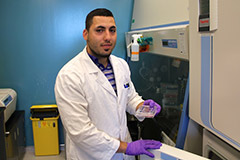Uncommon hospitality
By Alisa Kim
Anthony Eiliazadeh fell in love with the University of Toronto campus as a high-school student in the two-week engineering enrichment program offered by the university's faculty of applied science and engineering. Two years later, Eiliazadeh, who was born and raised in England, was back at U of T to begin his bachelor of science degree. He was in the middle of his neuroscience program when he returned to England to transfer into the engineering program at the University of Manchester—a field in which Eiliazadeh is intent on working—but keeps U of T and Toronto close to his heart. "I really like Toronto," he says, flashing a tattoo of the CN Tower on his left bicep. "Every summer since I've gone back to England, I've been coming back."
Last December, the 22-year-old Briton contacted Dr. Juan Carlos Zúñiga-Pflücker, a senior scientist in Biological Sciences at Sunnybrook Research Institute (SRI), inquiring about the possibility of working in his lab over the summer.
Zúñiga-Pflücker, who holds the Canada Research Chair in Developmental Immunology, discovered how to grow T cells in a Petri dish using embryonic stem cells. T cells, a type of white blood cell, travel to the thymus where they mature and become an essential part of the immune system. "[Working in] JC's lab, I thought, was quite unrealistic because I read his profile and he is such a high figure in immunology," says Eiliazadeh.
Following a videoconference interview over Skype, Zúñiga-Pflücker agreed to take him on as a summer student. Eiliazadeh is one of 25 undergraduates in the D+H Summer Student Research Program at SRI, a highly competitive program in which students gain practical experience using the methods and technologies of a given field.
Eiliazadeh's project involves stimulating stem cells to develop into early T cells in vitro. Over the summer he's been working on a combination of proteins that, when added to stem cells, activates a cell signaling pathway and induces differentiation into early T cells.
Trained by senior lab staff, Eiliazadeh does western blots, a technique used to detect specific proteins in a sample, and transfections, a method of introducing genetic material into a cell.
Although he felt nervous his first day on the job, he found the lab environment supportive. "Maybe it's the Canadian politeness, but everyone was really down-to-earth and helpful. If I got stuck, I had no trouble asking for help. It made it easier to integrate into the position," he says.
Eilizadeh, who is contemplating doing his PhD, says the hands-on experience at SRI has illuminated his understanding of scientific concepts. "This has been so beneficial to me. I've learned so many techniques. I knew how to do tissue culture before I came, but I didn't know what a transfection was. It's completely different reading it and doing it. My fourth-year exams will be more focused on tissue engineering, and I think I'll be much more prepared."






